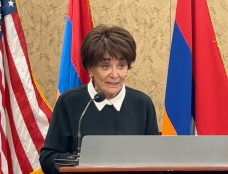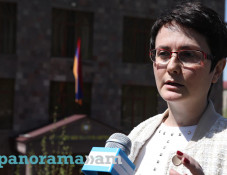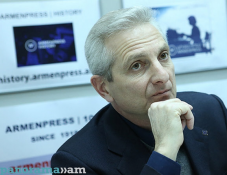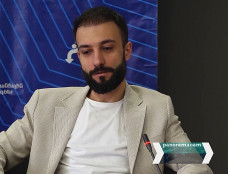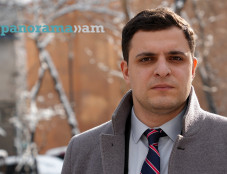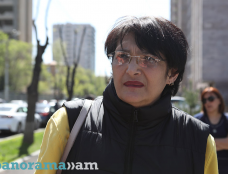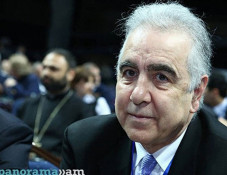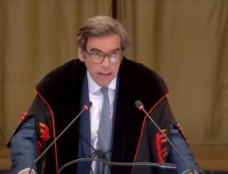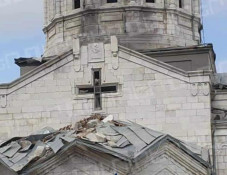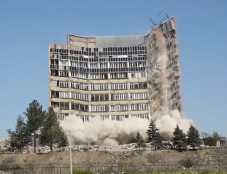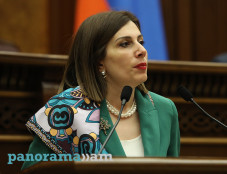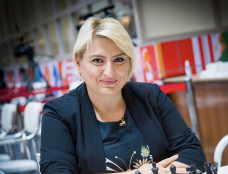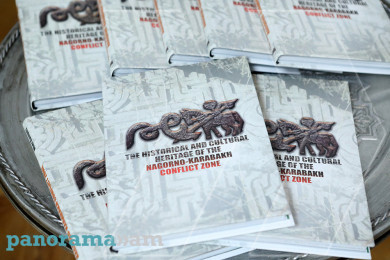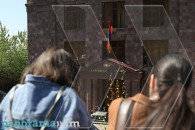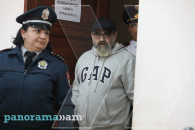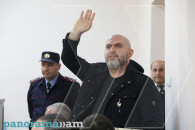Aleksander Safarov: Ancient map published in press triggered pogroms of Armenians in Baku
Karabakhrecords.info published Aleksander Safarov’s article “Black January” about the events he witnessed in Baku on 20 January 1991. In Azerbaijan, the day is called “Black January” and stories about “the Soviet Army’s atrocities over the Azerbaijani civilians” are told and flowers are put to monuments, the author writes.
As the author describes, tanks “decorated” Baku streets for already a year, and the troops got their food supplies from the locals.
“The Armenians take various goodies to the soldiers, look hopefully into their eyes and say, ‘You are protecting us, aren’t you?’” Safarov recalls. He draw parallels with Baku’s Azerbaijani population who are concerned with another question, “You won’t shoot at us, will you?” The response that they would not shoot if they behaved well totally satisfied them. “They go away to bring more on the following day by traders’ instinct. They need guarantees for any turn of events,” the author points.
According to the story, the days before New Year were calm and nothing foreboded the impending misfortunes. The enterprises started to work recovering after the Armenian workers had been ousted before curfew was enforced. The Russians started to pack their things after the Armenians. However, Azerbaijan leadership realized that they could not do without qualified personnel, and started to persuade those ousted to come back and promised safety guarantees. “And they had the incaution to trust in promises, and came back,” Safarov writes.
The publication of a news report about the sale of an ancient geographical map, where Armenia stretched from the Black Sea to the Caspian, at a famous auction provoked an outburst of aggression against the Armenians by the Azerbaijanis. “The red crosses vanished from ambulance vehicles being replaced by crescents in a single night. In broad daylight, the mob burned up an Armenian church in the city center and killed the priest before everyone’s eyes. While the church was on fire, they used the ladders of the fire engines, which had arrived at the place, to cut down the crosses on it,” the author recalls.
Further, the mob broke down the fountain Seven Beauties leaving only the Azerbaijani beauty there. Then they drove a bulldozer over the Christian cemetery. “The republican papers wrote in those days, ‘In Armenia, they do not touch our mosques and cemeteries to say that we are beasts and barbarians while they are a civilized nation!’ Just this, nothing more and nothing less,” Safarov writes.
As the topic of “the refugees from Armenia” regards, the author recalls watching an Azerbaijani TV program where the “Yerazis” stated that no one had expelled them. Just the opposite, they persuaded the Azerbaijanis to stay. However, they were afraid to be made a scapegoat for the atrocities their fellow tribesmen committed. That is why they preferred to leave. “All the efforts the host made to get them accuse the Armenians failed,” Safarov points. He notes that the “Yerazis” did not understand what he wanted from them, and did not want to lie. Remarkably, the program was recklessly aired live.
Safarov’s story also includes facts about spreading rumors in order to provoke violence against the Armenians. In particular, he writes about an episode in an Azerbaijani village when someone spread rumors that allegedly “the damned Armenians lured a teenager into their village and killed him.” As a result, the Azerbaijanis armed themselves and rushed to the Armenians “to render justice” threatening to utterly slaughter the Armenian village. “An almost fivefold numerical superiority and the factor of suddenness – for the neighbors did not suspect anything – made the assaulters brave,” the author describes. In another instance, an Azerbaijani thief was killed as he was robbing the savings bank in an Armenian village: “But this was not important. The main factor was that he was Azerbaijani and he was killed in an Armenian village. The press made an awful noise.” Later the thief was found out to be shot at by a policeman, a “pure-blooded” Azerbaijani.
The story also includes information about how the “Popular Front” and villains of all levels used the “Yerazis” factor. “Once I witnessed the following picture on my way home. A ‘Yerazis’ group settled in a camp in the yard where our housing and communal services bureau was situated. The bureau head, a well-known thief and bribe-taker, conducted the spectacle,” the author recalls. On his signal, women pinched the children making them yell out at the top of their voice. The spectacle intended to evoke pity for the “victims” and seize the Armenians and Russians’ accommodation under that guise. “The bystanding Azerbaijanis noisily welcomed his initiative for it was not about their accommodation,” Safarov notes. The bureau head turned out to have already prepared the blanks of the orders for the Armenians, Russians and soldiers’ flats, and sold them to the “Yerazis” after the massacres in January 1990.
Taking advantage of the calmness of the year, the representatives of the “untitled nation” started to leave Baku. The property of those leaving was being deliberately damaged. Cranes rose the containers and banged them to the ground turning the fortune acquired over years into a pile of rubbles. The people were powerless against the lawlessness and they were forced to pay money so that their property was not broken, according to the story.
The demonstrations of the “Popular Front” renewed by November. Under the slogan “Bribe-takers, get away!” they spoke about completely another thing during the demonstrations, “He who does not sit now, is not Azerbaijani. Now let all the Azerbaijanis rise,” this is how the unity of the nation was being forged.
“During a backgammon game, an Azerbaijani told his Armenian neighbor that in case the Armenians were expelled and murdered again, he would slaughter him himself so that no one suspected him of friendship with an enemy of the Azerbaijani people. It really happened later,” the author recounts. Everyone knew that the factories almost openly made arms, and lists of addresses of the Armenians and soldiers, in first place, and the Russians, in the second place, were prepared. However, they still “confined themselves to talks.”
Aleksander Safarov claims being a witness of the Azerbaijanis making fireworks and dancing in the streets shouting “Glory be to Allah” for the earthquake in Armenia, while the whole world was shocked and help was offered from everywhere. Azerbaijan sent a railway train with fuel, “Congratulations on the earthquake! Wishing it to repeat!” being written on its cisterns. “The train was sent back, and it became clear that there would be no reconciliation. Such deeds are neither forgotten, nor forgiven,” the author highlights.
Safarov further describes the slaughterers’ behavior on 13 January 1990. Groups of twenty or thirty young armed Azerbaijanis rushed into the Armenians’ flats, murdered atrociously the owners without any regard of age or sex, and then went on looting. The victims’ neighbors enthusiastically joined them, and started to fight over the looted stuff. “They threw the corpses out of the windows and the mockery at them continued in the street. Before killing the women and boys, they raped them in turn before everyone’s eyes. The children did not yield to the adults; they, too, carried what they could while their parents yelled in approval. On the Ukraine Square, about forty of those beasts raped a 15-year-old Armenian girl one after another under their wives and children’s rapturous hooting. Another girl, 10 years old, was crucified on a balcony grid on Kamo Street; she remained hanging there until the troops entered the city. Children were burned alive on a fire near the cinema Shafag,” he writes.
“The first attack on the soldiers came with the start of the massacres. A kindergarten, with many officers’ children inside, was seized from dozens of locals. Then they said they would use the children as a shield if the soldiers took up any action, or they offered to change them with arms. One of the teachers managed to get out into the street and inform a group of officers, who were rushing to the unit on alarm. The guys did not wait for the headquarters’ decision and rushed to the rescue. Everything was done so swiftly that those bitchy bastards lost their head and were disarmed with bare hands,” Safarov writes.
The Azerbaijanis did not dare to assault the flotilla itself. They drove refuelers to apartment buildings and threatening to burn them down with the people inside, started negotiating. Meanwhile they were engaged in a “safer” activity – throwing newborns out of the windows of Krupskaya maternity hospital. The Azerbaijanis also undertook an attempt to seize the Military Marine Academy – they demanded the Armenian officers and their families for revenge.
“Meanwhile massacres are going on in the city. The territory of the flotilla is packed with people who seek our help. Here one can meet Armenians, Russians and even Azerbaijanis, who do not want to participate in the massacres and fear revenge for that,” Safarov testifies. According to the story, the situation continued until 19 January, when the arms were at last given back to the flotilla. “Troops are expected to be deployed into the city, and we are supposed to screen them,” he remembers.
Troops started to enter the city at night of 19-20 January. “They went from three directions sweeping barricades on their way. They were shot at from the windows. Interestingly, those shots came from the Russians and Armenians’ flats so that the response fire did not damage the Azerbaijanis’ flats,” the author notes.
He writes that the Azerbaijanis had placed two rows of people in front of the barricades of lorries: one was made of Armenians hands tied to each other, the second row consisted of women, old people and children – residents from the houses nearby. A microbus with some fifteen armed thugs hid behind the barricade.
The approaching troops did not suspect that the crowd to which they spoke with a megaphone urging to disperse and clear their way, were in reality hostages. “In response, gunfire bursts from the barricades. The major and some of the soldiers fall on the ground. These were the first military losses. Shooting out all the cartridges, the thugs hastily get into the microbus, which disappears in the narrow side streets of the city outskirts,” the author writes.
When the tanks drove at the barricades, the Azerbaijanis in the “second row” disappeared, while the Armenians tied in the first row were tangling themselves in the ropes and falling down. Realizing that those were hostages, the officers freed them and advised them to go home. Little did they know that those people had no homes any more. “So now they are running by the tanks’ side. They have no one else to rely on and they are running with their last bit of strength: they know that if they fall behind, they will be finished off. They believe that the Soviet soldier will not let the Soviet people be killed,” the author writes.
A night combat was on in the city: the troops were shooting into the air, while being under an aimed fire conducted from the roof corners and windows. In Salyan barracks, Azerbaijani cadets were fighting against their fellow soldiers, according to the story.
“On the fourth day, the Azerbaijani side asked an armistice to bury those killed from its side. To that aim, they asked the Defense Minister marshal Yazov to take the troops away from the city streets. They also asked him to take away the units stationed in Baku streets completely. They justly reasoned that there will be no need to expect for mercy after seeing all their atrocities with their own eyes. Yazov acceded to their request, and the tanks and soldiers hid behind the fences of enterprises,” Safarov recalls.
The funeral was conducted in a special pomp. An endless flow of a million people went to the alley of the solemn funeral. Later, those graves will become an evidence for all the visitors how the army killed unarmed people, and even not only Azerbaijanis… On the burial place, the minister Elmira Gafarova promised in powerful speakers to take revenge for the victims and vowed that those wrong will be choked in their own blood.
Those wrong, these are all we…
Related:
The Voice of Russia: In Azerbaijan murder on ethnic grounds is a governmental policy
Armenian pogroms in Baku: The New York Times - Indifference and silence can cause another genocide
Newsfeed
Videos





